Alan Garcia v Hugo Chavez
After months of verbal tension and frozen diplomatic relations between Caracas and Lima, Alan Garcia, Peru’s new president, and his Venezuelan counterpart missed out on two opportunities for a face-to-face confrontation.

The first was the inauguration ceremony of Bolivia’s Constituent Assembly on August 6, which neither Garcia nor Hugo Chavez attended. The second, a day later, was the inauguration of Alvaro Uribe as Colombian president. Chavez chose to stay away.
Would they be intentionally avoiding each other? Possibly.
When Garcia took office on July 28, he was accompanied by eight Latin American heads of state and many other dignitaries. But there was one absentee: Venezuela.
Garcia and Chavez have been on a collision course since April when they started trading insults and accusations amid Chavez’s full and public support for Ollanta Humala, a nationalist candidate who lost the second round of presidential elections to Garcia by a thin margin.
Garcia accused Chavez of meddling in Peru’s domestic affairs by trying to impose “his” candidate. Chavez accused Garcia of being a pro-American serving the corrupt “oligarchy” of Peru.
On July 11 Chavez warned Garcia against trying to group other leaders in the continent against Venezuela. But Garcia had already started to forge alliances, even with Chavez’s friends on the left of the political spectrum.
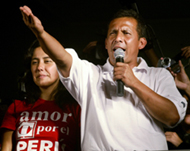 |
|
Humala was Chavez’s choice |
One would not have expected to find Evo Morales – Bolivia’s socialist president, Chavez’s strongest and closest ally in South America and a friend of Humala’s – at Garcia’s inauguration. Yet there he was. He says he is now on a self-appointed mission to reconcile the two leaders.
As for Brazil’s president, Inacio Lula da Silva, another Chavez ally and friend, many believe that he sees in Garcia a counterbalance to the Venezuelan leader, whose unconventional progressive initiatives across the continent – funded by an ever-stronger petrodollar – have had considerable success.
Michele Bachelet, the Chilean president, was also there. Her visit to Lima has been described as historic because the two neighbours have never really been friendly, given their history of wars. She is probably interested in Peru’s gas: Chile used to buy Bolivian gas via Argentina, but Bolivia nationalised its energy sector in May and those supplies will no longer be available.
Garcia is now leading the efforts to bring Chile back into the Andean Community – Colombia, Peru, Bolivia, Ecuador and until recently Venezuela, which pulled out after Colombia and Peru signed free-trade agreements with the US.
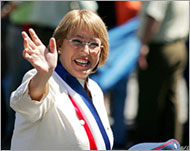 |
|
Bachelet: Prospecting for gas? |
Colombia’s president, Alvaro Uribe – whom Chavez considers a dear friend despite his liberal ideology – expressed his great “admiration” and “affection” for Garcia. Uribe, an ally of Washington, may be feeling lonely in a predominantly left-wing continent and is probably seeking regional partners such as Garcia.
Nobody knows how close Garcia will be to Washington. He denies reports that the US embassy and the CIA supported him during the second round of elections. Clearly the US hopes that he will continue what was started by his pro-American, liberal predecessor, Alejandro Toledo.
The US trade secretary, Carlos Gutierrez, carried that message to Garcia’s inauguration.
So will Garcia, a 56-year-old lawyer educated in Europe, be the polar opposite of Chavez, a former rebellious army officer?
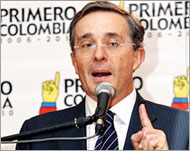 |
|
Alvaro Uribe: Feeling lonely |
For Garcia, the competition began when he would talk of Chavez as though he were a rival presidential candidate.
Yet he should be grateful to Chavez and to Humala. He owes his victory on June 4 partly to fears that Humala, also a former rebellious army officer, would have been an authoritarian anti-imperialist – a Chavez puppet who would have nationalised the energy sector and made radical changes to existing neo-liberal and pro-US policies.
Garcia is a social democrat who belongs to the centre-left APRA, Peru’s oldest political party. However, he has learnt to compromise. He promised to maintain the macroeconomic discipline well enforced by Toledo, and thus won support from the political right and business, which preferred him to the anti-capitalist Humala.
Hours before the vote, many residents of Lima said they would vote for Garcia. They still hated him for what he had done to them in his first mandate between 1985 and 1990, but he would keep Humala from the top job – and they did not want Chavez meddling in their affairs.
It was a vote of fear, or, as many put it, for the lesser of two evils.
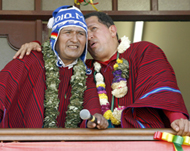 |
| Morales, left, is close to Chavez, but attended Garcia’s ceremony |
In rural areas, however, the story was different. In Cuzco, Arequipa and other cities in the poor south Andean region, residents wanted a change. They viewed Garcia as an unwanted ghost from a grim past, and Humala as a hope for a better future where they would finally get a slice of a cake previously eaten solely by the rich.
In those regions Humala got up to 80 per cent of the vote.
Had the Peruvian electoral system been based on a single round, Humala would have won. Had it been based on electoral colleges, as in the US, Humala still would have won.
Deep down, Garcia knows that very well, and he realises that millions of people in a now severely divided Peru are very unhappy with him being in power.
Being a tactful politician, he tried in his inaugural speech to reach out to those who voted for his rival. He pledged to end growing inequality by spending $1.6 billion on roads, schools and health clinics in the poorest rural areas.
Had the Peruvian electoral system been based on a single round, Humala would have won |
EU money, especially from Spain, will help. Spain, Peru’s biggest foreign investor, would naturally want to prevent an ally of Morales from coming close to power again because nationalising the energy sector damaged its gas interests in neighbouring Bolivia.
Garcia knows that Peru’s 13 million poor, half of the population, must be given adequate attention to avoid any social unrest or “catastrophe”, as he puts it. Any such catastrophe would certainly boost Humala’s position in Peru where he now officially leads the opposition. It would also strengthen Chavez’s position in the continent.
Garcia, once the most hated politician in Peru’s history, admits to serious mistakes when he took office the first time, aged only 35.
|
As president, Garcia has full immunity from any legal and judicial action in Peru |
Many Peruvians relate horror stories about what they endured under his leadership, when Peru suffered one of the worst economic crises in history. Inflation reached 7,000 per cent, corruption boomed, food was scarce and the leftist insurgency lived its most glorious days.
Garcia was still subject to investigations and lawsuits before the election. Survivors and relatives of victims of what is known as the Fronton Massacre had hoped to sue him for allegedly ordering the killing of hundreds of unconvicted prisoners in 1986.
The story never got the attention of a media too busy talking about what atrocities his rival would commit if he were to become president. Now, as president, Garcia has full immunity from any legal and judicial action in Peru.
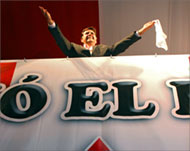 |
|
Garcia’s policies seem mixed |
So will Garcia be up to the top job this time? Will he fall again into the fatal trap of easy promises? It is too early to say. His policies seem to be a vague mixture of left and right. Chavez is banking on their failure.
The two men will certainly be watching each other’s steps. They seem to enjoy insulting each other via the media. The bad news for both is that any integration project for South America that excludes either Venezuela or Peru will be incomplete.
The leader of Venezuela’s Bolivarian Revolution seems determined not to let anyone, especially the mighty US and its allies in the region, stand in his way. The good news for him is that his integration project has already started to breathe – while Garcia’s project has yet to be born.